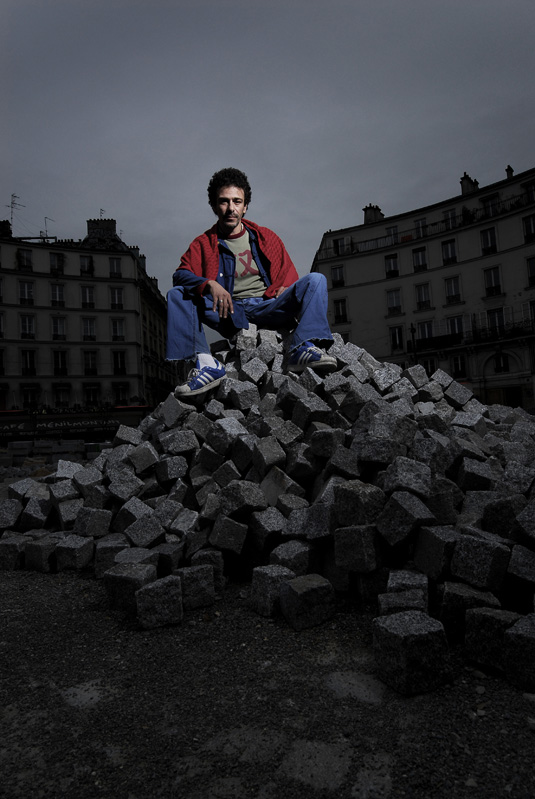 Amazigh Kateb [Algeriet-Frankrike] The word “amazigh” means to free the people in the Berber language, something which may seem a contradiction when thinking of the oppression Berbers have endured throughout history. Maybe it is just because of this that Kateb Yacine chose the name for his son. Kateb Yacine, also one of North Africa’s most known and influential authors, who has his whole life fought against the injustice and discrimination of the Berber in Algeria and gnawas (a tribe from West Sudan who in the 1500’s was deported to North Africa by, among others, the Algerian ruler). Amazigh explains himself that he feels like a modern time gnawa. He immigrated to France as a sixteen year old after his father’s death in 1989 and came there to face a deep rooted hostility against foreigners with a North African background. To work against this socio-political injustice that he experienced, the young Algerian started his music group Gnawa Diffusion in 1992 (who attended Clandestino Festival in 2005). One year later they released their first mini-album “Légitime différence” which followed with an extensive tour in France. Gnawa Diffusion made a wide impact thanks to their electrical soundscapes in combination with their sharp political message and can be viewed as one of France’s most interesting alternative music groups. In 2007 began Amazigh Kateb his solo career where he dived deep down into his heart to dig out the literary riches his father left behind. The result did not have to wait long. Shortly, he released his first record “Marchez Noir” (Walk Black). Amazigh describes the album as a manifest of love, revolution, laughter, dance, sweat and resistance. The music he describes as something new: a focus on the song and text with room for musical pauses and individual reflection. A rich variation of chaabi, rai, gnawi, ragga, reggae, local rhythms with Arabian and Turkish influences, blended with rock, electronica and hiphop. The driving force is to lift up the rich cultural resources that exist in Algeria and to include something that Amazigh describes as the African dimension: “In order to become reconciled with the African dimension we must first make amends with the Africa we plundered, gnawas – the Black people in Maghreb. Their culture has had the strength to withstand while adopting our traditions, our language, our religion.” The music’s soul is acoustic with Amar Chaoui on percussion, Mohamed Abdennour on mandolin, banjo and guitar. Besides the musical elements there is a deeper soulful connection to the memory of Amazigh’s father who affected him both as a person and an artist. Through giving his father’s texts new life in his own music Kateb Yacine has been reborn: “I no longer dream of my father, he is standing beside me.”
Amazigh Kateb [Algeriet-Frankrike] The word “amazigh” means to free the people in the Berber language, something which may seem a contradiction when thinking of the oppression Berbers have endured throughout history. Maybe it is just because of this that Kateb Yacine chose the name for his son. Kateb Yacine, also one of North Africa’s most known and influential authors, who has his whole life fought against the injustice and discrimination of the Berber in Algeria and gnawas (a tribe from West Sudan who in the 1500’s was deported to North Africa by, among others, the Algerian ruler). Amazigh explains himself that he feels like a modern time gnawa. He immigrated to France as a sixteen year old after his father’s death in 1989 and came there to face a deep rooted hostility against foreigners with a North African background. To work against this socio-political injustice that he experienced, the young Algerian started his music group Gnawa Diffusion in 1992 (who attended Clandestino Festival in 2005). One year later they released their first mini-album “Légitime différence” which followed with an extensive tour in France. Gnawa Diffusion made a wide impact thanks to their electrical soundscapes in combination with their sharp political message and can be viewed as one of France’s most interesting alternative music groups. In 2007 began Amazigh Kateb his solo career where he dived deep down into his heart to dig out the literary riches his father left behind. The result did not have to wait long. Shortly, he released his first record “Marchez Noir” (Walk Black). Amazigh describes the album as a manifest of love, revolution, laughter, dance, sweat and resistance. The music he describes as something new: a focus on the song and text with room for musical pauses and individual reflection. A rich variation of chaabi, rai, gnawi, ragga, reggae, local rhythms with Arabian and Turkish influences, blended with rock, electronica and hiphop. The driving force is to lift up the rich cultural resources that exist in Algeria and to include something that Amazigh describes as the African dimension: “In order to become reconciled with the African dimension we must first make amends with the Africa we plundered, gnawas – the Black people in Maghreb. Their culture has had the strength to withstand while adopting our traditions, our language, our religion.” The music’s soul is acoustic with Amar Chaoui on percussion, Mohamed Abdennour on mandolin, banjo and guitar. Besides the musical elements there is a deeper soulful connection to the memory of Amazigh’s father who affected him both as a person and an artist. Through giving his father’s texts new life in his own music Kateb Yacine has been reborn: “I no longer dream of my father, he is standing beside me.”
